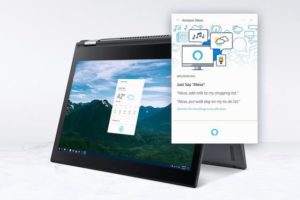
The proliferation of Alexa in every device imaginable has been an important trend over the last couple of years. You can talk to it, make Amazon orders, ask it to play music, and even play games. So why not have it on your laptop or desktop PC?
The first reason is because although you may not use it much, your PC already has a built-in virtual assistant called Cortana. This is Microsoft’s own virtual assistant, which already replicates a lot of the same functionality on your PC, meaning you’ll always have two virtual assistants vying for your attention.
It’s not a dissimilar situation to what happened with Samsung’s 2017 smartphone, the Galaxy S8. Leading up to its release, Samsung made a big deal about Bixby, its new proprietary voice assistant. Bixby was lacking in features and delayed at launch. Worse, S8 owners had immediate access to two voice assistants. A long press of the home button would call up Google Assistant, while the dedicated button on the side would bring up Bixby. It was a total mess.
Bringing Alexa to Windows 10 PCs will result in a similarly confusing experience. Cortana is baked into the Windows 10 experience, with integration across the board, while it doesn’t look as if Alexa will be optimized for the PC in any significant way. Chances are, it’s probably going to be better at selling you things on Amazon than increasing your PC productivity.
Want to use a voice assistant to ask what the weather outside is like, or who won the game last night? Now you’ll have two options built into your PC. Faced with so many ways of accomplishing that task via voice, you’ll probably end up just Googling it, or using your phone.
Besides, using a voice assistant on a PC doesn’t make lot of sense to begin with. It can be convenient to use Alexa to order food, make phone calls, or turn on music when you’re cooking or cleaning the house. When your hands are in position on input devices like keyboards and mice, though, using voice control is the slowest way to get anything done.
As I write this, I am surrounded by a cornucopia of virtual assistants. Cortana on my PC, Google Assistant on my phone, Alexa on a smart speaker nearby in the office, and Siri on my MacBook Pro — all of them anxiously listening and waiting to be helpful. They all have specific use cases when they’re helpful, but Alexa on a PC is just not one of them.


